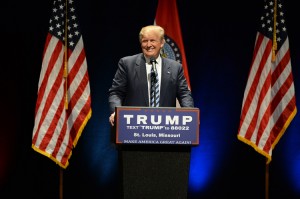Frontrunners Take New York
Wednesday, April 20th, 2016April 20, 2016

Democratic presidential candidate Hillary Clinton won her party’s New York primary, edging closer to the nomination.
Credit: © R. Gino Santa Maria, Shutterstock
Yesterday, April 19, Democrat Hillary Clinton and Republican Donald Trump padded their leads at the highly anticipated New York state presidential primaries. Clinton, who once represented New York in the U.S. Senate, collected 58 percent of the Democratic vote, winning easily over rival Bernie Sanders. Sanders, a Brooklyn native, had carried the last several but smaller state primaries, and had hoped for a better showing. Clinton’s New York win makes her the likely nominee at this July’s Democratic convention. Clinton added 139 New York delegates (out of 247), giving her a total of 1,930—including 502 superdelegates who have (so far) committed their votes to her campaign. Sanders has 1,189 delegates, 38 of which are “super.” Clinton needs just 453 more delegates to secure the minimum nomination total of 2,383.

Donald Trump easily won the Republican New York primary, adding to his lead over rival Ted Cruz.
Credit: © R. Gino Santa Maria, Shutterstock
Trump, who grew up in New York City, took 61 percent of the Republican vote, adding 89 New York delegates to his lead. John Kasich earned 25 percent of the vote and 3 delegates. Ted Cruz took just 14 percent of the vote and zero delegates. Trump now has 845 out of the 1,237 delegates needed to win the Republican nomination. Cruz is in second place with 559.
Connecticut, Delaware, Maryland, Pennsylvania, and Rhode Island go to the primary polls next week.


